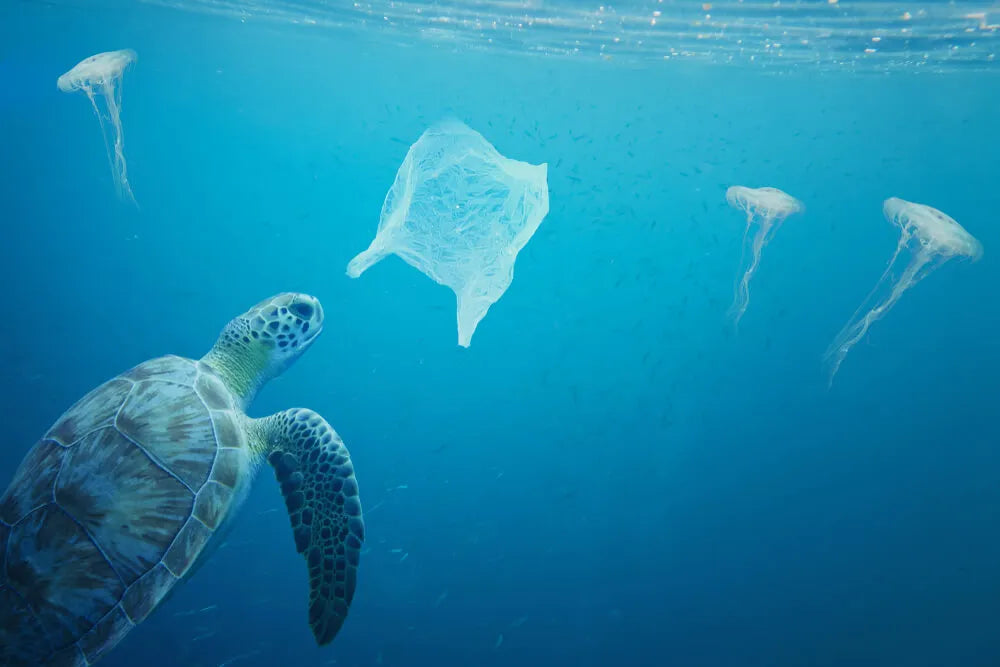Did you know that small pieces of plastic - microplastics - have been found contaminating the Arctic's ice core?
The Earth is struggling to cope with the amount of plastic we're using, and here are the facts and stats to prove it.
Single-use plastic pollution: The impact on our oceans, wildlife & planet
It's no secret that plastic pollution is destructive to wildlife and our environment, particularly aquatic creatures.
We use plastic every day. Some of the main examples of single-use plastic include plastic bottles, cotton buds, straws, coffee lids, wrapping, bags and plastic cutlery. When these macroplastics degrade over hundreds of years, they don't actually disappear, they break down into tiny pieces and toxic fragments called microplastic. These miniscule fibres are everywhere. How big is the issue of plastic pollution for our seas and its creatures?
- Plastic rubbish resembles food to many marine creatures, particularly sea turtles who can confuse bags for jellyfish. Its consumption causes them to starve, choke or sustain internal injuries like clogged or punctured guts.
- According to the UN, plastic kills one million seabirds and 100,000 sea mammals each year. [source]
- In 2019, a dead whale was found with 40 kilos of plastic waste in its stomach. [source]
- 90% of marine birds and fish are estimated to have plastic in their stomach. [source]
- A sea turtle has a 22% chance of dying if it ingests just one piece of plastic.
- Once a turtle has 14 plastic items in its digestive tract, it has a 50% chance of dying. [source]
- If marine plastic pollution continues at its current rate, by 2050 the plastic waste in the sea will weigh more than the world's population of fish. [source]
- Globally, it's estimated that 52% of sea turtles have eaten plastic waste. [source]
- Nine in 10 sea birds are thought to have ingested plastic waste. [source]
It's not just the oceans. Land animals - including those that humans consume - are affected by plastic pollution. Microplastic pollution in soil, sediments and other bodies of water poses a real danger to our ecosystems. They have even been found in our tap water.
- Over 50% of cattle in Kenya were found to have plastic bags in their stomachs, before the country moved to ban single-use plastic bags completely. [source]
- In 2019, it was reported that 60,000 cows in France suffered from tumours and infections caused by an accumulation of plastic in their rumen. [source]
- Microplastic contamination on land is estimated to be anywhere from four to 23 times higher than marine microplastic pollution. This can have a long-term negative impact as plastic enters the food chain and contaminates soil. [source]
- Billions of people are ingesting microplastic in the water they drink out of their taps; a study found 83% of global tap water samples to be contaminated, including 72% of European samples. [source]
Make a lasting change today.
There's demand out there to make the change, and the good news is that we can all be part of it. By making small changes to our individual and family lifestyles, we can reduce the amount of waste entering our landscapes and oceans. Do your part by committing to a plastic-free July.
As convenient as it may be, the small plastic bottle is one of the most littered items in the world, contributing to one third of all marine pollution. Make the easy change to a reusable, sustainable solution with Doulton's stylish TASTE bottle - ideal for staying hydrated with great-tasting, healthy filtered water on the go.
Looking to take more steps towards sustainability as a family? Drinking more water is a great place to start. An at-home water filtration system - such as our
undercounter systems - which will help you to swap pollution for hydration, reducing temptation to reach for plastic bottled soft drinks.






